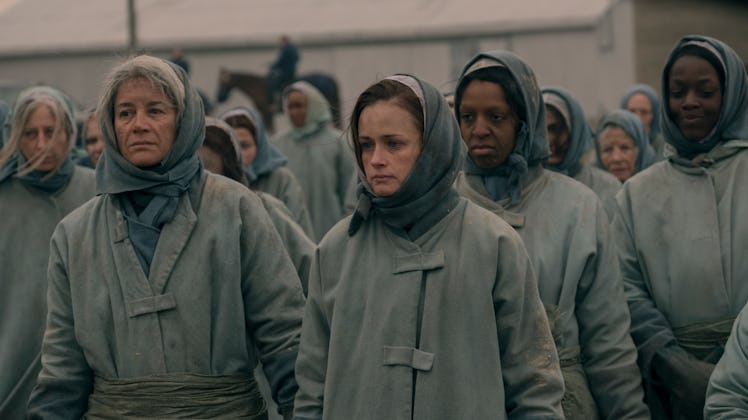
'The Handmaid's Tale' Fans Have This Major Question About Emily's Life At The Colonies
One of the significant casting coups for The Handmaid's Tale Season 2 was the great Marisa Tomei. The My Cousin Vinny actor was known for a while to have been cast in a guest star turn, but up until the season premiere, all viewers knew was that Tomei played a Wife and would be connected to the Colonies, where Emily (Alexis Bledel) was serving time. Her character finally turned up in Episode 2, in which she and Emily seemed to connect instantly. But Emily shocked viewers when she murdered Tomei’s character in cold blood. So, who was she, and why did Emily poison her? Let’s recap.
Warning: Spoilers for The Handmaid's Tale Season 2, Episode 2 (titled “Unwomen”) follow. Marisa Tomei's character turned up about a quarter of the way into Episode 2. Like many banished to the Colonies, she didn’t even have a name, she was just known as "Wife." It was her status in her former life, and it was all her fellow inmates saw when she arrived on the short bus from Gilead to start serving her time: A Wife, part of those who oppress, and therefore the enemy.
A Wife who is no longer a Wife was a rare sight out in these blasted lands. But she was a prisoner of the Colonies just like everyone else. So, how did she wind up there? Moreover, why was Emily so friendly to her at first? As a Handmaid, Emily was someone Wives held down so their husbands could rape her. One would assume Handmaids and Wives were strictly enemies.
But, as fans saw with Serena Joy (Yvonne Strahovski), this Wife was a prisoner of the system, the same as the Handmaids. Like Emily, she, too, had a college degree (an MFA in interior design). And yet, when the revolution came, this Wife didn't wind up a Handmaid or a Martha. She married the right sort of person and lived the right kind of lifestyle. Moreover, despite her insistence she was "appalled" by Gilead's policies, she was deeply religious in the right sort of way for Gilead. She nattered on that "education" doesn't make one somehow a sinner against God, as if somehow that was an argument that held merit.
This woman’s privileged life showed at every turn. For example, she assumed Emily's knowledge of diseases and herbs and her biology degree was why she was stationed in the Colonies, not because she was a banished Handmaid. (Emily didn't bother correcting her.) This assumption of a sort of faux equality between them made the former Wife feel comfortable enough to tell Emily she’d had an affair — and to confess how deeply jealous she was of her Handmaid and her husband's sex life, underscoring how utterly unconcerned she was that the Handmaid was not in a consensual relationship on any level.
Although the Wife didn’t tell Emily who she wound up having an affair with, the assumption was easy. It was most likely a male servant in her household, who she could sleep with while her husband enjoyed raping his Handmaid. She argued that she fell in love, and that God would understand.
This cri-de-coeur seemed to move Emily. In response, she gave the Wife a little bottle of pills, which she told her were antibiotics to help her when the water at the Colonies started to do a number on her digestive system. It was a surprising kindness, more than this Wife deserved, fans probably thought.
But it was all a trick. Emily wasn't friendly to her. She made the Wife trust her because, in her view, the Wife was a fool to allow herself to enjoy the benefits of this life and think she was somehow above it all. The bottle of pills wasn't full of antibiotics. It was poison. Emily punished the Wife for all the things Handmaids suffer while Wives look on. There was no sympathy in her face as the Wife died.
The Handmaid’s Tale is streaming on Hulu.
This article was originally published on